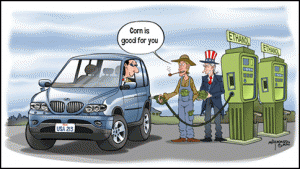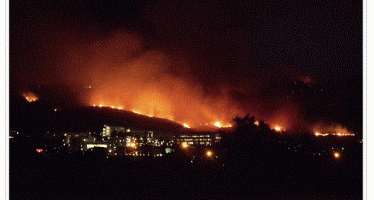Judge Cancels California Trade War
By WAYNE LUSVARDI
Trade war!
The newspaper headlines last week read, “California Low Carbon Fuel Standard Blocked in Court.” It was a component of California’s AB 32, the Global Warming Solutions Act of 2006, which was scheduled to be implemented on Jan. 1, 2012.
But did the headlines tell the whole story? Did the low-carbon fuel standards imposed by the California Air Resource Board, which implements AB 32, involve reducing air pollution emissions? Or was it an interstate trade war?
That must have been the question that ethanol producers were asking. After all, they were being told by California that the amount of ethanol in gasoline was being increased from 5.7 to 10 percent to reduce air pollution. Simultaneously, they were being told that interstate trade of ethanol was being banned under AB 32.
Last week’s ruling was by U.S. Federal Judge Lawrence O’Neill, a native Californian. He ruled that California couldn’t “balkanize” the commercial market for low-carbon fuels such as ethanol as part of its strategy to reduce greenhouse gas emissions. He said the part of California’s AB 32 dealing with low carbon fuel standards was unconstitutional and violated the Interstate Commerce Clause. The Commerce Clause gives the federal government sole jurisdiction over interstate trade.
America’s Founding Fathers put it in the Constitution to prevent states from fighting trade wars against one another. A key to American prosperity has been that the whole country is a vast free-trade zone.
In essence, CARB wanted to go back before the Constitution and set up its own sovereign governmental rules as if California were a separate country. But the court didn’t buy the environmental rationale and ruled it was both unconstitutional and an interstate trade issue.
The low carbon fuels standard part of AB 32 would have allowed California corn farmers to have an oligopoly on ethanol production. But California corn growers also sell ethanol to other states and out-of-state ethanol producers import to California. This resulted in a lawsuit brought by both in-state and out-of-state farmers that ended up in O’Neill’s courtroom. California is the largest ethanol market in the country.
The lawsuit was brought by the Rocky Mountain Farmers Union, the Redwood County Minnesota Corn and Soybean Growers, Penny Newman Grain Inc., Growth Energy Renewable Fuels Association, farmer and rancher Rex Nederend, the Fresno County Farm Bureau, the Nisei Farmers League and the California Dairy Campaign. The lawsuit was joined with another suit brought by the National Petrochemical and Refiners Association, the American Trucking Association, the Center for North American Energy Security and the Consumer Energy Alliance.
Ethanol Always Politicized
Ethanol use always has been controversial in the United States. Going back to 1840, ethanol was used as a fuel in lamps before the advent of electricity. But a tax was levied on alcohol during the Civil War, rendering it uneconomic. In 1906, the tax was eventually repealed.
Henry Ford’s Model T automobile originally was fueled by ethanol or gasoline until 1908. When Prohibition of alcohol was enacted in 1920, ethanol sellers were accused of being moonshiners. Prohibition was more than just a moral crusade. It involved a trade war.
When a mass market for ethanol was created, it resulted in it becoming a sort of currency. Ethanol competed with cheaper gasoline as a commodity.
MTBE and Ethanol Mandates
Beginning in the 1970’s, ethanol began to be required to be blended with gasoline to reduce air pollution as part of the Federal Clean Air Act. The Federal minimum standard was a 5.7 percent ethanol blend to meet the 2 percent oxygen requirement of the Act. The maximum standard was a 10 percent ethanol, 90 percent gasoline blend.
However, California instead chose to use MTBE -– methyl tertiary butyl ether — as an additive to gasoline. MTBE is derived from methane and isobutylene. Methanol is made from natural gas and butane comes from crude oil or natural gas. In other words, MTBE comes from fossil fuels. California’s choice of MTBE denied Midwest corn growers the California fuel additive market. But California ended up banning MTBE after it was found that it infiltrated groundwater supplies by leaking from underground gas station fuel storage tanks.
MTBE is an oxygen additive or fuel booster that results in lower gasoline consumption. As California inadvertently contaminated groundwater basins with MTBE, it concurrently was mandating the cleanup of perchlorate — also an oxygen additive — from groundwater supplies. Perchlorate is dubbed a “rocket fuel booster” due to its use in rocket and missile fuels. The proverbial left hand of California bureaucracy didn’t know what the right hand was doing.
By 1999, California banned MTBE. In 2003, it chose to use ethanol instead, but only in the minimum amount of 5.7 percent to meet federal clean air standards. Apparently, California wasn’t concerned that much about air quality in 2003 to raise the ethanol standard to 10 percent.
By 2012, California was scheduled to shift to a 10 percent ethanol blend in its gasoline. Concurrently, it was apparently hoping to corner the increased market on ethanol through the low-carbon fuel standard part AB 32. Judge Lawrence O’Neill’s injunction put a stop to this.
Ethanol cannot feasibly be shipped through pipelines, as can liquid hydrocarbons such as gasoline or gaseous hydrocarbons such as natural gas.
Congress Kills Ethanol Tax Credits and Tariffs
Is it coincidental that last week the U.S. Congress decided to allow the tax credit for ethanol producers to expire? Back in June 2011, even the Democratic Party-controlled U.S. Senate voted 73 to 27 terminate the 45 cent per gallon subsidy and the 54 cent per gallon tariff on ethanol imports. The law was set to expire in any event.
But this doesn’t kill the federal mandate to use a minimum amount of ethanol each year as a fuel additive. Fifteen billion gallons must be used in 2015, rising to 36 billion gallons by 2036.
Reportedly, the ethanol subsidy costs taxpayers about $6 billion each year. It has ended up transferring $45 billion to ethanol producers over the past 30 years.
So the government-created market for ethanol will continue, but without tax credits and tariffs. Brazil can produce ethanol cheaper from sugar cane than U.S. growers can from No. 2 corn.
Context
Last week’s newspaper accounts about a federal court striking down the low-carbon fuel standards section of AB 32 were accurate. What they lacked was sufficient context to understand it.
Apparently the low-carbon fuels part of AB 32 was an attempt to buy off California’s corn farmers as well as ethanol blending refineries. But they couldn’t be bought off. They sued. This is why AB 32 is often seen as a protection scheme with few real environmental benefits.
Related Articles
Gun safety legislation comes under fire from unusual suspects
Whatever their enthusiasm or seriousness, California gun users have a new set of obstacles, thanks to fresh legislation intended to
CA Senate OKs GOP drought declaration
“Fire, water and government know nothing of mercy,” runs an Albanian proverb. So far in 2014, California has been wracked
SoCal support for bullet train wavers
California’s beleaguered high-speed rail project has hit yet another speed bump: a loss of confidence among Southern California officials already





